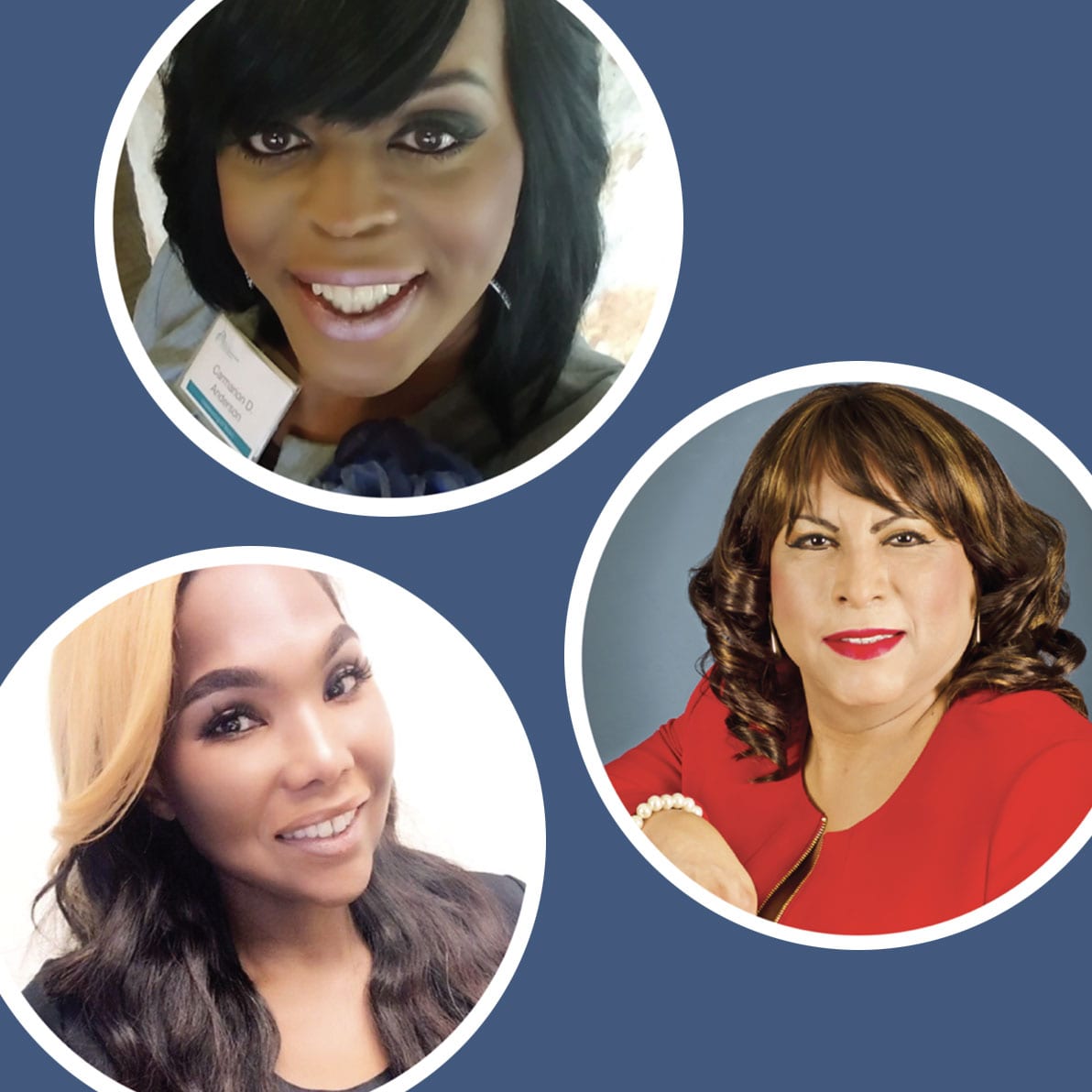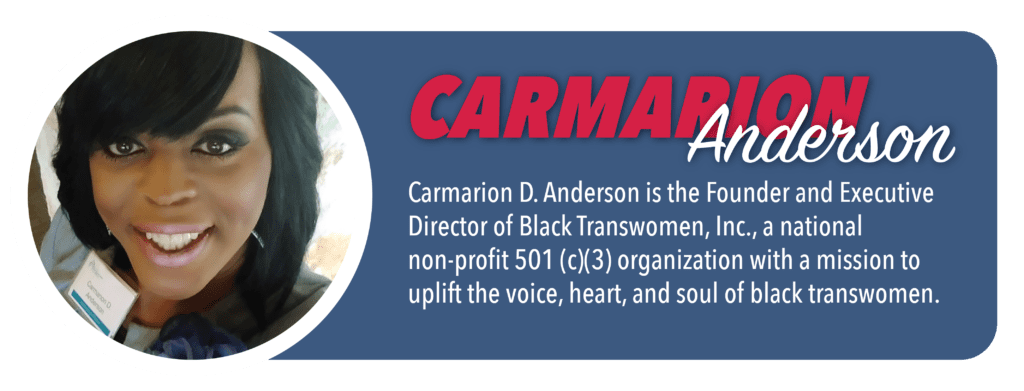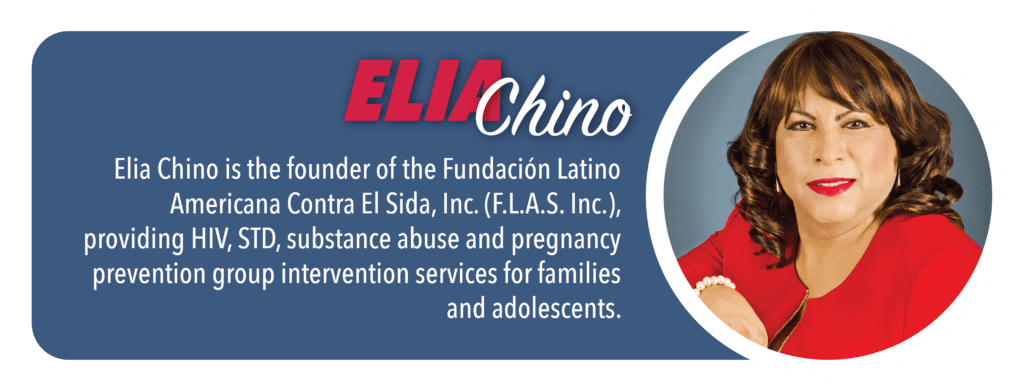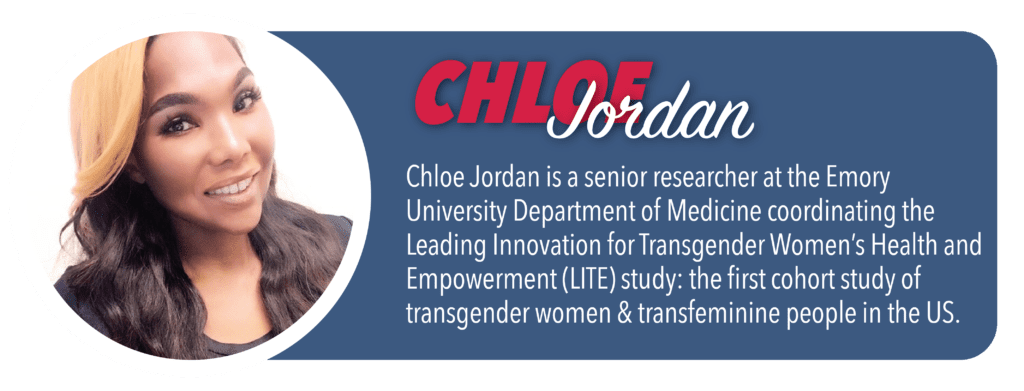Marcus Stanley is Engaging Communities to Combat HIV/AIDS
Our friends over at Public Health Perspectives, a podcast series presented by JPHMP, sat down with our very own Marcus

In this spotlight, we were able to sit down with three phenomenal individuals who have been integral in the fight against HIV in the South. These women are helping to aggressively move the needle, so we found it necessary to showcase them and some of the great work they are doing in the South. Learn a little about these three transformational leaders below and then dive into the Q&A afterward!






How do you think you and your organization have contributed to moving the needle forward for the trans community?
Elia Chino: “We have provided help with screening, providing mental health services, trauma-informed approach to care, linkage to care as well as other social services. Organizations like us need to be able to provide more awareness for the trans community and offer more inclusion into healthcare services across the board. Living in the dark, the trans community doesn’t want to put themselves out there – here, we’re training them to be a voice for themselves and others”.
Carmarion D. Anderson: “Touching more on the resource side, my organization works to eliminate health disparities for the trans-identified community. It’s important that there is representation within the trans community, we need to agree as a collective and disseminate the good work that’s done, show up, and have a plan. There are other trans-identified organizations that need to be partnered with so that they can learn, teach, and grow with. Our organization is managed, run, and operated by trans individuals – and that’s key. We can all help one another. If it’s our collective goal, then we need to move forward together – in the ways we collaborate, re-audit who’s at the table – all of the above. In order to get to zero for HIV for every vulnerable community there need to be more inclusive campaigns, complete elimination of stigma, and advancement of current HIV initiatives.”
Chloe Jordan: “We’re pioneering an unprecedented study where we’re producing premium data and highlighting the voices of these girls to ensure they are counted. We’re taking in their personal account and leveraging our platform for them to be a voice for those who have not had that chance. We’re providing access for trans people to get health care that addresses the majority of their medical needs. We are the 1% of the community/organizations that are adequately equipped to aid the community. What I would like to see is for others to follow and take notice of what we’re doing here. Most trans women are in disbelief that meetings or organizations will change anything. We should always aim to make lives better than the day before: economically, socially, and medically. Our approach has to be holistic.”
What do you believe are some of the top factors that put people in the trans community at risk?
EC: “There is not enough health and housing opportunities or education opportunities. We are marginalized and discriminated against and – again – there is a lot of transphobia that is associated. All of these factors combined lead to a high risk for HIV infection. The majority of the trans community does not have a job; what they do to survive is practice as sex workers. They often may have low self-esteem because of rejection from their families and society. This traumatization has led to mental health problems and abuse with other drugs. This has led not just to HIV, but to STDs and deaths”.
CA: “The data and resources we use to target the trans community are not sufficient. Because of this barrier, we start lumping some of this data into other behaviors. Behaviors and choices are different for trans women of color and in order to be more effective, there must be a separation on outreach and connecting to this community. Because of this, prevention measures and marketing does not reach this community, and thus must be honed in order to be more successful”.
CJ: “With behavioral biomedical research experience, I am aware that there’s a level of HIV infection and transmission. Of course, we all know about chronic homelessness, survival sex work, and the use of recreational drugs, which all have the potential to blur inhibitions and increase risk. Growing up and being part of such a unique population with such a small dating pool for trans people lends itself to another barrier that many people are not aware of. The pool is so shallow, and the numbers of male counterparts are so limited due to stigma that those men are recycled. So, let’s recap: recycling men in a high-risk community, transmissions are then cyclical – that’s definitely a high-risk factor that a lot of people forget”.


Do you feel the trans community is sufficiently reached by current HIV prevention measures?
EC: “Sometimes, they don’t want help. Sometimes they feel that they are being used by organizations or other governmental services provided. There is a common sense of mistrust in the community. The low self-esteem that they may have makes them feel like they are not important, and, as a result, use drugs and alcohol to escape from society”.
CA: “Absolutely not. We need to look at culture. We need to go back to the drawing board and craft a universal health language that is associated with the trans-identified community. Prevention and healthcare services react less and understand more. Testing for the trans-identified community will be different because there are different behaviors in this demographic. The trans-identified community, as well as the HIV community, need to have a voice at the table so we can start to produce meaningful and strategic initiatives for the trans-identified community”.
CJ: “I do not. Both transmen and women are not reached sufficiently. Some are at risk due to sexual practices, and the fact that gender expression and attraction are not interdependent only further complicate the matter. Considering all that has been done for MSM, there has been no in-depth consideration for women. As a trans woman, we must stand up and be counted, be vocal, be visible – to show the world that there is a problem and a lack of messaging. Servicing transwomen in HIV prevention needs to be a high priority and not just a specialty group”.
Can you talk about some of the stigma surrounding people in the trans community?
EC: “Stigma is always a huge problem in the trans community. It’s not just about HIV. There is very low self-esteem. It’s a marginalized, discriminated community that experiences a lot of transphobia. There’s also a lot of trauma that these people experience – physical, emotional and sexual abuse – even within families”.
CA: “Being that I am a black woman, trans-identified, intentional and authentic, I experience many levels of stigma. What people need to be aware of is when there is not a binary definition of something, it comes with the attachment of stigma. This doesn’t allow for inclusivity and becomes very challenging for people to accept. It’s hard to identify the many stigmas that the trans-identified community faces because there is not one single definition”.
CJ: “HIV, prostitution, hypersexualization, risqué behaviors, deviance, being mentally unstable – these are just some of the perceptions that plague this community. Some individuals have pre-existing conditions prior to transitioning as they were dealing with existing stigmas imposed by societal norms”.
Have you ever experienced stigma, discrimination, social rejection and/or exclusion when seeking medical or mental healthcare services? If so, what was your experience and how did you deal with it?
EC: “Yes, especially in the hospital or the clinic. Sometimes, people – they don’t treat you right. They’ll use another name. Sometimes they ask you questions that don’t align with your gender identity. There are a lot of things that don’t apply to me. Sometimes the body language of the health providers is offensive. We need to provide more frontline training for health providers to help deliver sensitive services for the community. This should be our priority”.
CA: “I am fortunate enough to not have experienced in a healthcare setting. However, when I’m in a setting and have to outline that I am a trans-identified woman, they are stuck – they don’t know how to transition what to share and how to diagnose me. So, I look at it as a teaching moment – in order to provide culturally sensitive care, they need additional education on the subject”.
CJ: “There are times when I feel small and inadequate when I enter a room. I battle with relationships because I won’t settle for being underappreciated. I personally experienced discrimination when inquiring or receiving health-related services. In a certain situation, I escalated the situation to the appropriate channels and, as a result, trans-affirming systems were implemented. People need to escalate and let it be known: speak out! Speaking out is very critical. This is one of the main things that I’ve been able to contribute to public health as a whole – to speak about what it is we are experiencing as a community and how healthcare services and organizations act as barriers to our community receiving resources and services the institution is offering”.
What can allies and advocates do to help reduce those stigmas?
EC: “We need to provide a lot of awareness to reduce the stigmas. We need to train health providers about the stigmas and the issues. We need to let them know that we are human beings too, and we need to be respected. We need to develop appropriate services, and we need to get the trans community on board”.
CA: “First of all, they need to be included at the table and in the heart of the conversation. They need to show up courageous. Not only live up their truth but speak their truth to others. Look at policies and see where change can be made. Our motto is “patience through education.” In addition, our allies need to show up in the absence of us. We need to engage our allies and relook at the position of our allies. There’s a certain level of privilege, and the first step to identifying that privilege, and partnering to reduce it and educate others starts with a conversation. However, allies cannot be a substitute for the trans voice. Allies need to encourage the trans-identified community, and we need to think about what we are doing to prepare our allies to continue supporting us”.
CJ: “First, allies must be culturally aware and understand that the trans community is affected by stigma. In the healthcare setting, cultural competency and sensitivity trainings are a must. Speak out, educate, and speak with trans people. I have seen where it’s starting to be done, but there is so much more work to do. Here in Atlanta, at Grady Memorial Hospital, organizations are coming in and doing sensitivity trainings. It’s great. But it needs to be more widespread because a lot of people have preconceived notions about what it means to be trans and are often not willing to receive information”.


When you think about how mental health is addressed in the trans community, what comes to mind?
EC: “A lot of people think that mental health is not a problem, but it is not being addressed. There are a lot of needs that should be addressed so people could understand the importance”.
CA: “Current education does not support the choice of lived, authentic and courageous experiences of the trans-identified community. But they experience challenges in living out their truth. We need to be able to provide holistic healthcare services to more adequately address needs”.
CJ: “When people think about the trans community, they often type case them as “crazy” due to cross-gender hormone therapy. But that is not the case at all. So, in addition to this stigma, the community will also experience anxiety disorders, gender dysphoria, and a number of other mental health-related conditions that build on top of these existing barriers”.
What are some of the resources and services the trans community needs access to that they aren’t presently receiving?
EC: “Access to hormones, for one. And access to healthcare services provided by their own trans community so that the care they receive is trusted. They also require inclusion into housing, proper education and all aspects of healthcare services.
CA: “To answer this, we need to look at the social determinants of health. Look at what the trans community needs in order to thrive – prevention first, then high-risk behavior, then education. The trans-identified community needs advanced programs and referral services to housing. Most shelters are not equipped to serve, and most people don’t realize this. We may show up and not be accepted. So, we need to understand how to empower without shaming, encourage healthier sex choices, etc. We need to completely gut referral services. Universal inclusive language for the trans community will help with empowerment. There’s much more that we need to do, but we don’t need to reinvent the wheel. We need to take the time to reevaluate and invest in vulnerable communities and get them at the table to assist agencies in being more inclusive”.
CJ: “Housing. Without a question. How can you adhere to anything if you’re in an unstable place? How can you adhere to prevention or treatment if you are homeless? If you don’t have a place to call your “home”? We need a holistic approach to rehabilitative services. By default, a lot of transwomen are put into a place of performing survival sex work. Being put into this position makes the behavior become normalized and habitual for them. Once they’re in this position, how do you transition them into the workforce? It’s not as easy as: “Go get a job!”, when they’re used to sex work. There needs to be some really concrete and very detailed rehabilitation services provided to transwomen transitioning from sex work”.


What do you think needs to happen in order for the trans community to feel more comfortable and safe seeking care (in particular, HIV services)?
EC: “They need to be seen by their own people. They need to have their own trans clinics and have their own organizations. They need the training in the medical field to be equal and on par across all providers. However, they need to respect themselves and love themselves in order to accomplish this. What else needs to happen? We need to be positive and more inviting and more responsible in our lives because the organizations will not do it for us. We need to be more assertive and more prepared and more educated. There are a lot of barriers and a lack of resources. The community feels angry, frustrated, like they are going to be erased, wiped out, etc., but I live by the motto that I must help myself in order to help my community – and others should too”.
CA: “We need to be careful with how we are marketing, and how quick we are to use the word safe. That word doesn’t make too much sense to me. What we need to do is create a brave and courageous space that offers and extends grace to both parties. We need to look at how we develop inclusive language, how we reduce barriers and increase inclusivity, and ultimately help the trans-identified community to increase medication adherence”.
CJ: “There needs to be a general understanding of HIV services (for those considered high risk), greater access to prevention and treatment, resources for housing, food, and jobs, etc. We need to also incorporate any and all other resources that the community might benefit from eliminating the barriers that exist for them to get it”.
Our friends over at Public Health Perspectives, a podcast series presented by JPHMP, sat down with our very own Marcus
NBHAAD 2019: Highlighting Impactful Organizations in the South Each year on February 7th, we recognize National Black HIV/AIDS Awareness Day
Did you know that April 7th is World Health Day? This is an international health awareness day that has been
Who doesn't love a little #inspo? To help those applying for the 2020 Transformative Grant, we wanted to speak with
It's part two of our #inspo! (check out part one here) To help those applying for the 2020 Transformative Grant,
©2024 Emory University, Inc. All rights reserved.
When you click this link, you will be directed to an external webpage hosted by LearnUpon LMS.
Kindly note that registration is required, and it’s entirely free of charge.
To access the learning modules, you will need to create a new login, as this platform operates independently and is not affiliated or connected with OpenWater or any other platforms used by the Gilead COMPASS Initiative®.